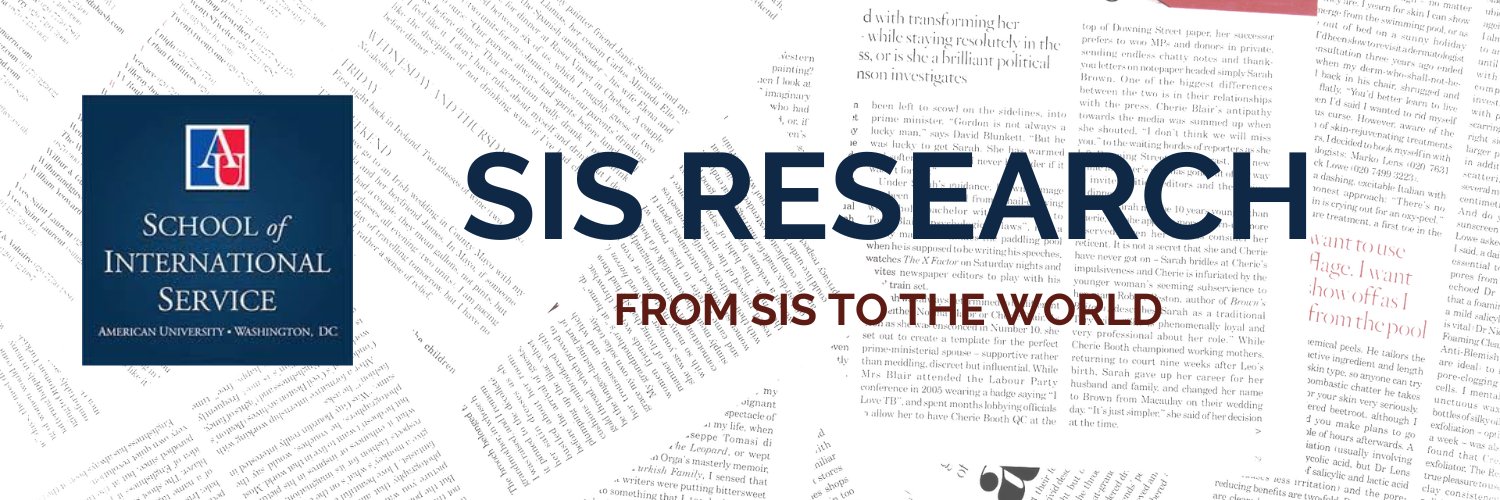
SIS Office of Research
@research_sis
@AU_SIS #SIS Office of #Research supports #promotion, #communication, #impact, #opportunities and #visibility of #changemaking #scholarship. #sisresearch RTDEE.
Rather than turn him away from the Chinese Communist Party, Xi Jingping’s experiences as the son of a purged party leader led him to subscribe to a cause for which his father suffered, writes @JosephTorigian. foreignaffairs.com/china/xi-jinpi…
Read @JosephTorigian on how Xi Jinping’s plans for China have been influenced by the life, career, and ideology of his father: foreignaffairs.com/china/xi-jinpi…
🚨Don't miss Garret Martin's latest piece on @NATO 's Hague summit for the @CDAInstitute ! @AU_SIS @research_sis
The Hague Summit avoided public confrontation with Trump and secured a major defence spending increase, but sidestepped critical issues, leaving the Alliance’s long-term direction and cohesion uncertain. Garret Martin's latest. @AU_EuropeCenter @AmericanU bit.ly/40uMUjo
🌍Climate change isn’t just an environmental crisis — it’s a mental health crisis, too. In a new co-authored article, @AU_SIS Prof. Lauren Carruth expands the idea of "ecological grief" to include displacement and loss of livelihood in Kenya & Ethiopia. american.edu/sis/research/h…

What happens when cyber tools fall into the wrong hands, and what can be done to prevent it from happening? SIS professor Claudia Hofmann discusses her recent research on this topic in this new Q&A. @research_sis bit.ly/458yvvU
How can faith-based community initiatives counter urban violence and organized crime? A new article by @AU_SIS professor @mabunimer_nimer explores this question through the Palestinian community in Israel over the past two decades. Read more here: american.edu/sis/research/h…

A new article co-authored by SIS professor Tazreena Sajjad and Jack Spehn, SIS/MA ’25, for the @Immigration_Lab (@aucollege) explores the role of the private sector detention industry in immigration enforcement. Check it out here ➡️ bit.ly/4lZxVq7
In his new book, “America at the Crossroads: Race, Islam, and Leadership,” SIS distinguished professor @AskAkbar urges a nation divided by fear and polarization to seek an inclusive path forward. Learn more about the book here ⬇️ bit.ly/3GpvU7k
Very happy to have this publication out with @NewlinesInst on the recent Kurdistan gas deals with the American energy firms and their implications. I argue that the deals demand a clear policy response from the U.S. policy-making. @AU_SIS @KurdishSIS newlinesinstitute.org/geo-economics/…
The KRG’s $110B gas deals with U.S. companies could boost Kurdish autonomy, weaken Iran’s influence, and shift U.S. policy in Iraq, but U.S. support is vital to manage the risks involved, @AU_SIS Prof. @YerevanSaeed argues in a new piece for @NewLinesInst. newlinesinstitute.org/geo-economics/…
SIS distinguished professor and Ibn Khaldun Chair of Islamic Studies @AskAkbar discusses key insights about his new book, “America at the Crossroads: Race, Islam, and Leadership." @research_sis bit.ly/3GpvU7k
What damage did the US do to Iran’s nuclear program, and why is it so hard to know for sure? In this new piece published by @ConversationUS, SIS professor @JoshRovner1 explains why battle damage assessment is notoriously difficult. @research_sis bit.ly/4kdJpEV
📢 HUGE NEWS: @AmericanU's Model United Nations team has been ranked the number one team in the @BestDelegate college Model UN final rankings for 2024-2025, notching a HISTORY-MAKING four-peat! 👏 Congratulations to the team! bit.ly/4lyNEfk
I wrote a primer on the technical and political problems of bomb damage assessment for @ConversationUS theconversation.com/what-damage-di…
What are the risks of non-state actors gaining access to spyware, and what can governments do about it? A new @dgapev policy memo from @AU_SIS professor Claudia Hofmann explores this question and outlines policy recs for European states and institutions. american.edu/sis/research/h…

In a recent piece for @ConversationUS, SIS professor @william_akoto explains why the United States’ efforts to decouple its economy from rivals like China may not be the best defense against cyber espionage and state-sponsored hacking. ⬇️ @research_sis bit.ly/44oaZK0
@AU_SIS's Ken Conca offers a cautionary tale about a Maryland town's efforts to manage its flood risk after two disasters. bit.ly/3DXNSwf
In my latest op-ed for The Conversation, I argue that supply-chain decoupling won't stop cyber economic espionage. It might even make it worse. theconversation.com/blocking-expor…
What is the hungry season, and why is it an annual recurrence in parts of West Africa? In this new episode of Big World, SIS professor Jesse Ribot explains what he’s discovered about the causes of hunger in West Africa. bit.ly/3RQQmAc
"The White House is more likely to join the war against Iran if it accepts Israeli intelligence at face value. But in doing so, it will sacrifice its strategic flexibility and risk losing diplomatic leverage," Professor @JoshRovner1 writes @WarOnTheRocks.warontherocks.com/2025/06/intell…